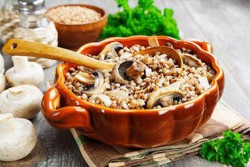Benefits
Amazing Benefits of Roasted Buckwheat
Buckwheat – a nutrient-packed, gluten-free seed that is now becoming increasingly popular in Canada, Europe, and UK due to its many health benefits.
While most people think of buckwheat as a whole grain, it’s actually a seed that is high in both protein and fiber. It supports heart health and can help prevent diabetes and digestive disorders. In fact, buckwheat seeds, also called “groats,” are so packed with nutrients and antioxidants − like rutin, tannins, and catechin −that they are often called “superfoods.”
Buckwheat is a great alternative to wheat. Buckwheat is a gluten-free grain, making it an excellent choice for those with celiac disease, gluten sensitivities, food allergies, or for anyone undertaking a super-clean diet. It can be used as an alternative to rice or served as porridge and it’s higher in protein and fibre than other grains. Buckwheat is also lower on the glycemic index and results in less insulin release after consumption. It’s known to lower cholesterol and is a rich source of magnesium.
In Tibet, it is said that Buckwheat is "not only food but also medicine"
Very important tips:
Do not confuse roasted buckwheat with raw one!!!
Roasted buckwheat meal is called Kasha!
Kasha is a food that can be served both as a savory dish and a sweet one.
It is the best alternative to rice, pasta, and potatoes!
You cannot do the same with raw buckwheat!
Savory Kasha is prepared seasoned with salt and flavored with butter.
Kasha is full of protein (x3 time more than quinoa or couscous)
Goes really well with mushrooms and onions, stir-fried veggies
seafood, meat, fish, etc.
experiment, it is great with almost anything.
see recipe suggestions
- Cook like rice -
The best food in the world
Buckwheat may be one of the healthiest foods you’re not eating. Along with having numerous health benefits, it is tasty, easy to prepare and inexpensive.Kasha is the only food on Earth that is a staple and super at the same time!

The healthier substitute for rice or pasta
Roasted Buckwheat Kasha is so much healthier than rice, pasta or potatoes! Using roasted buckwheat you can make andy rice or pasta dish!As a base, it is good for savory or sweet meals! Goes well with any kind of meat, can make stir-fry etc etc!

So delicious!
Roasted buckwheat kasha has an amazing nutty, earthy flavor!Like no other staple food, you can eat roasted buckwheat with just some butter and you'll love it!
Our gently roasted buckwheat has the best taste at the market!

Unlikely to cause bloating
Yes, buckwheat is generally considered a food that is unlikely to cause bloating, making it a good alternative for people who experience bloating from other grains like wheat; it's often recommended as a less bloating-inducing option.
Free of Chemicals
Since it grows effortless and successfully, it does not require any pesticides, so you’re free to digest chemical worry free.
Low-Calorie Food
Buckwheat is high in inositol, which makes this a low-calorie and well-balanced food. Buckwheat lowers fat accumulation and can help maintain the body’s metabolic rate
Buckwheat contains components of
Proximates, Minerals, Vitamins, Amino Acids, Antioxidants:





